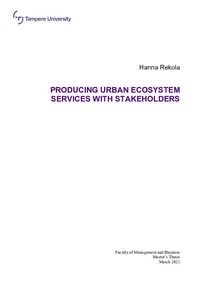Producing Urban Ecosystem Services With Stakeholders
Rekola, Hanna (2021)
Rekola, Hanna
2021
Kauppatieteiden maisteriohjelma - Master's Programme in Business Studies
Johtamisen ja talouden tiedekunta - Faculty of Management and Business
This publication is copyrighted. You may download, display and print it for Your own personal use. Commercial use is prohibited.
Hyväksymispäivämäärä
2021-03-31
Julkaisun pysyvä osoite on
https://urn.fi/URN:NBN:fi:tuni-202103122543
https://urn.fi/URN:NBN:fi:tuni-202103122543
Tiivistelmä
Climate change is already impacting our habitat. In addition to restraining the climate change on proceeding people need to start adapting to inevitable changes that climate change will bring. Increasing storm waters in urban habitat is one of the consequences caused by climate change. There are natural ways to manage those increasing storm waters in our urban habitat, but the practice of producing these is relatively young. Using natural ways of managing storm waters increases the diversity of urban ecosystems as well. Previous research calls for more multidisciplinary research on ecosystem service production in collaboration with stakeholders. Stakeholder involvement in ecosystem service productions needs to be researched to figure out who can benefit from the ecosystems and what would be the best practices to produce and govern the ecosystem service. The purpose of this study is to increase understanding on the role of stakeholder involvement in producing natural and urban ecosystem services and what kind of values it creates to stakeholders or to the process.
Case projects used in this study shows three different processes of producing urban and natural storm water management systems. Main characteristics for three different processes are pilot, flagship and mundane. There were six interviews conducted for eight different persons who were the key persons involved in the cases. Using qualitative content analysis, this study recognizes key values generated for different stakeholders in all three cases. Theoretical background used in this study consists of previous research on stakeholder involvement in ecosystem service contexts and value co-creation. Using hierarchical value dimension framework, identified values are categorized to utilitarian values and hedonistic values. Utilitarian values are divided to functional values and economic values. Hedonistic values are divided to emotional values and symbolic values.
As findings in this study there are 12 key values identified. Functional values were learning, development and new routine and they were most essential values in the cases. Producing natural storm water management systems is a new practice globally and especially in Finland so it is natural and essential that testing and figuring out best practices is highlighted. Learning was also identified as a most missed value. Economic values were reference, business potential and monetizing. Private businesses are gathering reference to use in future offerings and there is a need to figure out costs for these kinds of projects. Emotional values were aesthetics, legitimation and community. They were mainly occurring at individual level and fostered personal values. Symbolic values were good example, imago and being green and they were occurring on individual and organizational level.
Findings in this study supports previous research on the subject and as previous research has already suggested there is still need for further research on this subject. Some of the values were also identified as missing values. With more systematic stakeholder involvement there could have been more learning and development between different stakeholders. Observing stakeholder involvement during the production of urban storm water production would offer a better understanding on the generated and missed values for different stakeholders. Including more private businesses and other potential private actors to the processes and research would generate understanding on present and future business potential that producing natural storm water management system has.
Case projects used in this study shows three different processes of producing urban and natural storm water management systems. Main characteristics for three different processes are pilot, flagship and mundane. There were six interviews conducted for eight different persons who were the key persons involved in the cases. Using qualitative content analysis, this study recognizes key values generated for different stakeholders in all three cases. Theoretical background used in this study consists of previous research on stakeholder involvement in ecosystem service contexts and value co-creation. Using hierarchical value dimension framework, identified values are categorized to utilitarian values and hedonistic values. Utilitarian values are divided to functional values and economic values. Hedonistic values are divided to emotional values and symbolic values.
As findings in this study there are 12 key values identified. Functional values were learning, development and new routine and they were most essential values in the cases. Producing natural storm water management systems is a new practice globally and especially in Finland so it is natural and essential that testing and figuring out best practices is highlighted. Learning was also identified as a most missed value. Economic values were reference, business potential and monetizing. Private businesses are gathering reference to use in future offerings and there is a need to figure out costs for these kinds of projects. Emotional values were aesthetics, legitimation and community. They were mainly occurring at individual level and fostered personal values. Symbolic values were good example, imago and being green and they were occurring on individual and organizational level.
Findings in this study supports previous research on the subject and as previous research has already suggested there is still need for further research on this subject. Some of the values were also identified as missing values. With more systematic stakeholder involvement there could have been more learning and development between different stakeholders. Observing stakeholder involvement during the production of urban storm water production would offer a better understanding on the generated and missed values for different stakeholders. Including more private businesses and other potential private actors to the processes and research would generate understanding on present and future business potential that producing natural storm water management system has.
